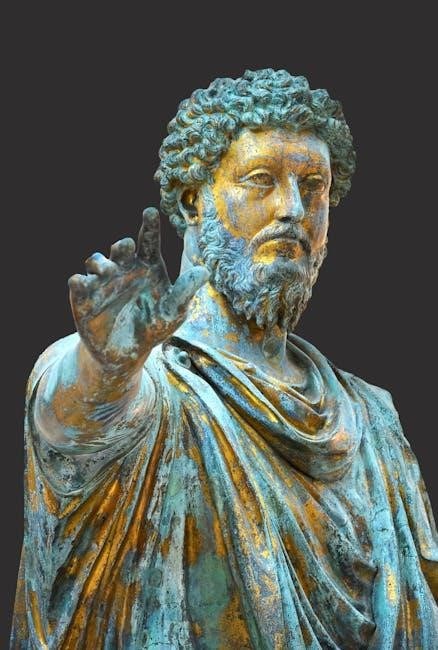Marcus Aurelius, a Roman emperor and philosopher, wrote Meditations, a timeless philosophical work reflecting his personal reflections on Stoicism and leadership.
Composed during military campaigns, the book offers insights into Aurelius’ inner struggles and wisdom, blending philosophy with practical advice for living.
Gregory Hays’ modern translation revitalizes the text, making it accessible while preserving its depth, offering readers a fresh perspective on Aurelius’ timeless teachings.
The PDF version of Hays’ translation is widely available, providing a convenient format for modern readers to engage with this enduring philosophical masterpiece.
Who Was Marcus Aurelius?
Marcus Aurelius was a Roman emperor and philosopher, ruling from 161 to 180 AD. Known as the “Philosopher King,” he embodied Stoic ideals, blending wisdom with leadership.
Born into an elite family, Aurelius succeeded his adoptive father as emperor, facing challenges like wars, plagues, and economic struggles. His writings, particularly Meditations, reveal his introspective nature and philosophical mindset.
Aurelius’ work emphasizes reason, self-discipline, and inner peace, offering timeless guidance. His unique role as both a ruler and philosopher makes his insights invaluable for understanding Stoicism and human resilience.
The Historical Context of Meditations
Marcus Aurelius wrote Meditations during his reign as Roman emperor (161–180 AD), amidst warfare, plagues, and political turmoil; These personal reflections capture his philosophical responses to adversity.
Composed in Greek while on military campaigns, the work reflects Aurelius’ efforts to reconcile his duties as a ruler with his Stoic beliefs. The text reveals his internal struggles and quest for virtue.
The period was marked by crises like the Antonine Plague and conflicts with Germanic tribes, influencing Aurelius’ contemplations on resilience, mortality, and the fleeting nature of life.
Though not intended for publication, Meditations survives as a unique glimpse into the mind of a philosopher-king, offering timeless wisdom on coping with challenges.
The Significance of Gregory Hays’ Translation
Gregory Hays’ translation of Meditations is the first in thirty-five years, offering a fresh, accessible interpretation of Aurelius’ timeless wisdom.
Hays’ work bridges ancient philosophy with modern readability, making the text more approachable while preserving its depth and relevance for contemporary audiences.
The PDF version of this translation is widely sought after, providing readers with a convenient way to explore Aurelius’ insights on life, resilience, and leadership.
Who Is Gregory Hays?
Gregory Hays is a renowned classicist and translator, celebrated for his work on ancient texts. His translation of Marcus Aurelius’ Meditations is the first in thirty-five years, offering a fresh, accessible interpretation of the philosopher-emperor’s writings. Hays’ expertise in classical languages and philosophy ensures the translation remains faithful to the original while engaging modern readers. His work has revitalized interest in Aurelius’ teachings, making them more approachable for contemporary audiences. The PDF version of his translation is widely popular, providing a convenient format for readers to explore the timeless wisdom of Meditations.
Why This Translation Matters
Gregory Hays’ translation of Meditations is a fresh interpretation that bridges ancient philosophy with modern readability. As the first new translation in thirty-five years, it offers a unique perspective, making Aurelius’ timeless wisdom accessible to contemporary readers. Hays’ work ensures the text’s clarity and depth are preserved while resonating with today’s audience. The availability of the PDF version further enhances its reach, allowing readers worldwide to engage with Aurelius’ teachings effortlessly. This translation not only revitalizes interest in Stoic philosophy but also ensures Meditations remains a relevant and essential read in the digital age.
Unique Features of the Hays Translation
Gregory Hays’ translation of Meditations stands out for its clarity and fidelity to the original text. His modern language rendering eliminates archaic phrasing, making the philosophical insights more approachable. Hays incorporates historical context in his introduction, enhancing understanding of Aurelius’ experiences. Additionally, his annotations provide deeper insights into key themes, enriching the reader’s interpretation. The PDF format of this translation offers a seamless reading experience, with well-organized sections and accessible navigation. These features collectively ensure that Hays’ version remains both authentic and engaging for today’s readers, making it a preferred choice among scholars and general audiences alike.

Key Themes and Concepts in Meditations
Marcus Aurelius’ Meditations explores Stoicism, self-control, and resilience. Themes include acceptance of change, the fleeting nature of life, and the pursuit of virtue. Aurelius’ teachings remain universally relevant.
The Philosophy of Stoicism
Stoicism, rooted in reason and self-control, emphasizes accepting life’s challenges with equanimity. Aurelius’ Meditations embody this philosophy, urging individuals to focus on what they can control and cultivate inner strength. The teachings stress the importance of living in harmony with nature and understanding the transient nature of life. By embracing Stoic principles, readers learn to navigate adversity with resilience and virtue. Gregory Hays’ translation captures the essence of Aurelius’ reflections, making Stoicism accessible and relevant for modern readers seeking wisdom and clarity in their lives.
Self-Reflection and Personal Growth
Marcus Aurelius’ Meditations is a profound guide to self-reflection, urging readers to examine their thoughts, emotions, and actions. Through journaling, Aurelius cultivated introspection, seeking wisdom and emotional resilience. His writings emphasize the importance of understanding oneself and aligning actions with virtuous principles. Gregory Hays’ translation makes these reflections accessible, encouraging modern readers to embrace personal growth. The text inspires individuals to confront challenges with clarity and humility, fostering a mindset rooted in continuous improvement and self-awareness. This timeless wisdom remains a powerful tool for those seeking inner transformation and a deeper understanding of themselves.
The Universality of Aurelius’ Teachings
Marcus Aurelius’ Meditations transcends time and culture, offering universal wisdom applicable to all. His reflections on resilience, ethics, and life’s challenges resonate with people from diverse backgrounds. Gregory Hays’ translation amplifies this universality, making the text accessible to modern readers. The themes of accepting change, embracing impermanence, and striving for inner peace are timeless. Aurelius’ teachings encourage readers to focus on what they can control and cultivate a mindset of compassion and humility. This universal appeal has made Meditations a cherished resource for personal growth and philosophical insight across centuries.

The Structure and Content of the Book
Meditations is a collection of personal reflections by Marcus Aurelius, written as private notes without a formal structure. The book’s fragmented style reflects Aurelius’ philosophical musings.
Gregory Hays’ translation maintains the original’s intimacy while enhancing readability. The text explores themes of duty, morality, and self-control, blending personal and universal insights.
How the Meditations Are Organized
Marcus Aurelius’ Meditations is organized as a collection of fragmented, personal reflections. The text is divided into 12 short books, each containing aphorisms and philosophical musings.
Written as private notes, the Meditations lack a formal structure, reflecting Aurelius’ spontaneous thoughts during his reign. Gregory Hays’ translation preserves this intimate, unpolished style, maintaining the original’s raw authenticity.
The book’s organization mirrors Aurelius’ mental explorations, blending diverse themes like duty, morality, and self-control. Each entry offers a glimpse into his inner world, creating a timeless, universal appeal.
Major Books and Their Focus Areas
Marcus Aurelius’ Meditations is divided into 12 books, each with distinct themes. Book 1 focuses on gratitude and key influences in his life. Books 2-4 explore the fleeting nature of life, reason, and overcoming obstacles. Book 5 emphasizes aligning actions with philosophical values. Book 6 uses analogies from nature to illustrate Stoic principles. Books 7-9 delve into adversity, self-awareness, and the interconnectedness of all things. Books 10-12 reflect on challenges, personal growth, and the pursuit of virtue. Gregory Hays’ translation maintains this structure, offering readers a clear journey through Aurelius’ philosophical journey.

Downloading the PDF Version
The PDF of Marcus Aurelius’ Meditations, translated by Gregory Hays, is online. Download from Scribd or other sites for easy access now.
Where to Find the Gregory Hays PDF
The Gregory Hays PDF of Marcus Aurelius’ Meditations is widely available online. Platforms like Scribd, Amazon, and various e-book repositories offer free or paid downloads.
Visit https://tiinyurl.com or search engines to find direct links. Ensure you download from reputable sources to avoid malware or incomplete files.
The PDF is also accessible through academic databases and libraries, making it easy for readers to explore Aurelius’ timeless wisdom in a convenient digital format.
Benefits of the Digital Format
The digital format of Marcus Aurelius’ Meditations, translated by Gregory Hays, offers unparalleled convenience and accessibility.
Readers can easily search, highlight, and navigate the text, enhancing their reading experience. The PDF is lightweight, requiring no physical space, and can be accessed on multiple devices.
It allows for seamless sharing and is environmentally friendly, reducing the need for paper. The digital version is ideal for modern readers seeking flexibility and ease in exploring Aurelius’ timeless wisdom.
The Impact and Legacy of Meditations
Marcus Aurelius’ Meditations has profoundly influenced modern thought, offering timeless wisdom on Stoicism, resilience, and leadership. Its relevance endures, shaping philosophy, literature, and personal growth globally.
How Meditations Influenced Modern Thought
Marcus Aurelius’ Meditations, especially through Gregory Hays’ translation, has reshaped modern philosophy and self-help movements. Its timeless wisdom on resilience, emotional intelligence, and Stoicism resonates deeply in contemporary culture.
The book’s themes of accepting change, embracing impermanence, and focusing on what one can control have inspired leaders, psychologists, and everyday readers. Its influence is evident in modern literature, corporate training, and personal development practices.
The availability of the PDF version has further amplified its reach, making Aurelius’ teachings accessible to a global audience. His insights continue to guide individuals in navigating life’s challenges with clarity and purpose.
Notable Admirers and Readers
Marcus Aurelius’ Meditations has captivated numerous influential figures throughout history. Philosophers, leaders, and modern thinkers like Ryan Holiday, Tim Ferriss, and Jordan Peterson frequently cite its wisdom.
These admirers often highlight the book’s relevance to modern life, emphasizing its teachings on resilience, virtue, and mindfulness. The Gregory Hays translation, particularly in its PDF form, has made these timeless ideas more accessible to a broader audience.
From entrepreneurs to psychologists, the universal appeal of Aurelius’ insights continues to inspire, proving that his meditations transcend time and cultural boundaries, offering guidance for contemporary challenges.

Applying the Teachings in Daily Life
Marcus Aurelius’ Meditations, translated by Gregory Hays, offers practical wisdom for modern life, encouraging mindfulness, resilience, and ethical decision-making in everyday challenges.
The teachings emphasize accepting change, fostering inner peace, and prioritizing virtue, providing a Stoic framework for navigating life’s complexities with clarity and purpose.
Practical Strategies from the Meditations
Marcus Aurelius’ Meditations offers actionable strategies for daily life, such as practicing gratitude, embracing impermanence, and focusing on what lies within your control.
Aurelius advocates for self-reflection, encouraging readers to question their thoughts and emotions, fostering emotional resilience and clarity in decision-making.
The concept of “negative visualization” helps cultivate contentment by imagining life without current comforts, while the “dichotomy of control” reminds us to focus only on what we can influence.
These Stoic principles, elegantly translated by Gregory Hays, provide a practical framework for navigating life’s challenges with equanimity and purpose.
How to Incorporate Stoic Philosophy into Modern Living
Stoic philosophy, as outlined in Marcus Aurelius’ Meditations, can be seamlessly integrated into modern life by focusing on mindfulness, self-awareness, and emotional resilience.
Practice daily reflection, as Aurelius did, to clarify thoughts and prioritize values, helping to navigate life’s complexities with clarity and purpose.
Embrace challenges as opportunities for growth, and detach from outcomes beyond your control, fostering a sense of peace amidst uncertainty.
By applying these timeless principles, individuals can cultivate a balanced, fulfilling life, aligning with the wisdom of Aurelius and the accessible insights of Gregory Hays’ translation.
Marcus Aurelius’ Meditations, elegantly translated by Gregory Hays, remains a timeless guide to Stoic wisdom, offering universal insights for modern life in an accessible PDF format.
The Enduring Relevance of Marcus Aurelius’ Meditations
Marcus Aurelius’ Meditations continues to resonate deeply, offering timeless wisdom on resilience, ethics, and self-reflection. Its universal themes transcend centuries, appealing to modern readers seeking guidance on life’s challenges. Gregory Hays’ translation breathes new life into the text, ensuring its relevance in contemporary society. The PDF format makes this philosophical treasure accessible worldwide, allowing readers to engage with Aurelius’ profound insights anytime, anywhere. His teachings on Stoicism remain a powerful tool for personal growth, making Meditations an indispensable resource for those navigating today’s fast-paced and often uncertain world;
Final Thoughts on the Gregory Hays Translation
Gregory Hays’ translation of Marcus Aurelius’ Meditations stands out for its clarity and fidelity to the original text. By rendering the emperor’s personal reflections in accessible language, Hays has made Stoic philosophy approachable to modern readers. The PDF version of his translation is particularly valuable, offering a portable and easily shareable format. This edition ensures that Aurelius’ timeless wisdom reaches a broader audience, maintaining its relevance in today’s world. Hays’ work is a testament to the enduring appeal of Meditations, bridging ancient philosophy with contemporary life seamlessly.
